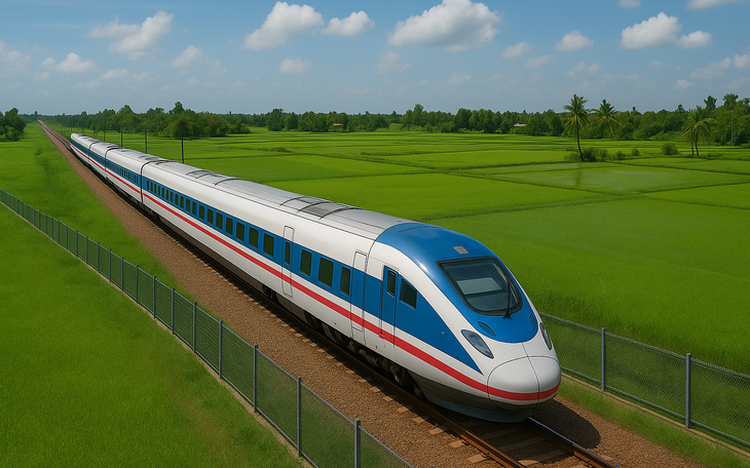
CT Group has proposed investing in the Ho Chi Minh City–Can Tho–Ca Mau railway project with a designed speed of 200–250 km/h. Photo: AI
The company plans to collaborate with reputable international partners to mobilize funding for the project.
In a document sent to Prime Minister Pham Minh Chinh and the construction minister, CT Group requested approval to conduct a pre-feasibility report and invest in the project under the public-private partnership model.
According to CT Group, it has been working with domestic and international organizations and contractors to study this railway project since 2020.
The company has signed a contract with China Railway Design Corporation to collaborate on the pre-feasibility report and an agreement with Power Construction Corporation of China to study investment models and propose implementing the project as an EPC (engineering, procurement, and construction) general contractor.
The firm proposed that the Ho Chi Minh City–Can Tho–Ca Mau railway will start at Thu Thiem Station and connect with the North–South high-speed railway and the line to Long Thanh International Airport.
In phase 1, the route will end at Cai Rang Station in Can Tho City. In phase 2, it will extend to Dat Mui Station in Ca Mau Province.
The route will pass through Ho Chi Minh City, Tay Ninh, Dong Thap, Vinh Long, Can Tho, and Ca Mau.
The rail is expected to span 160 km in phase 1 and 120 km in phase 2.
The line will be a double-track railway with a standard gauge of 1,435 mm, fully electrified and serving both passenger and freight transport.
The designed speed for initial operation will be 200–250 km/h, with studies exploring speeds up to 300–350 km/h.
Regarding financing, CT Group stated that it will work with international partners to secure funding.
The estimated investment cost of $12 billion excludes land clearance, relocation, and resettlement expenses, which will be covered by the state budget.
The company put forward a special public-private partnership structure: 80 percent of the funding would come from the state budget under the medium-term public investment plans and other legal sources. The remaining 20 percent would be contributed by the investor.
CT Group said it would contribute 75 percent of the revenue from land development projects, including 400 hectares near Tan Kien Station in Ho Chi Minh City, 200 hectares in the Can Tho railway urban area, and 200 hectares around the station in Ca Mau.
To facilitate the railway project, CT Group floated special mechanisms and policies, including exemptions on import taxes for construction equipment and spare parts, the ability to set competitive ticket pricing for passengers and cargo, and access to preferential loans covering 40–50 percent of the total investment.
In terms of timeline, CT Group suggested preparing and finalizing the pre-feasibility report during 2025–26, completing the feasibility study and environmental impact assessment in 2026–27, beginning construction in 2027, and commencing commercial operation between 2031 and 2032.
The My Thuan Project Management Board recently submitted a pre-feasibility study for the Ho Chi Minh City–Can Tho railway to the Ministry of Construction.
The 175.2km line will start at An Binh Station in Ho Chi Minh City and end at Can Tho Station in Hung Phu Ward, Can Tho City.
The line will be a newly built, electrified double-track railway with a standard gauge of 1,435 mm, designed to transport both passengers and cargo at a speed of 160 km/h.
Phase 1 will involve single-track construction with a total investment of VND173.6 trillion ($7.16 billion).
In phase 2, planned after 2030, a double track will be completed at an additional cost of nearly VND65 trillion ($2.7 billion).


Max: 1500 characters
There are no comments yet. Be the first to comment.